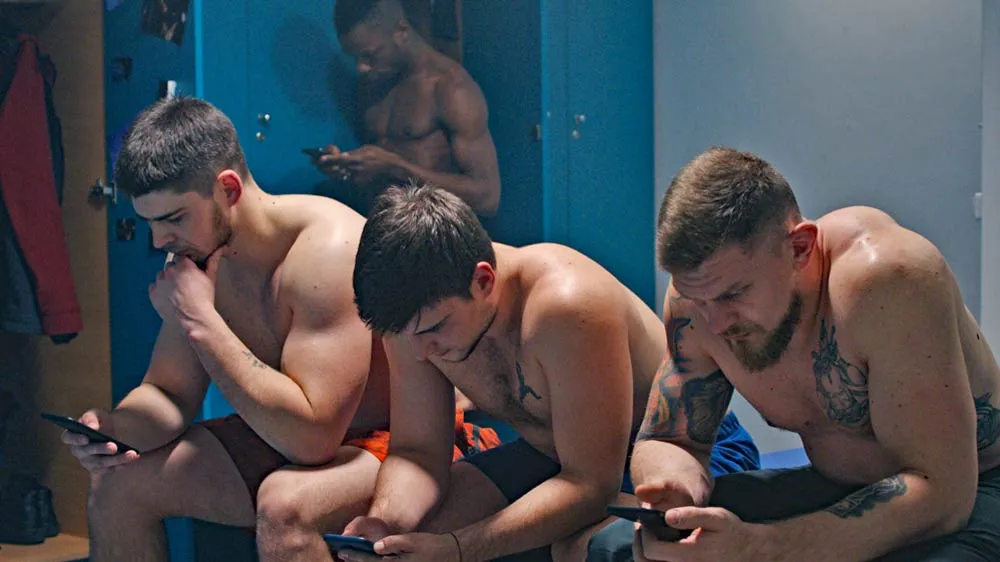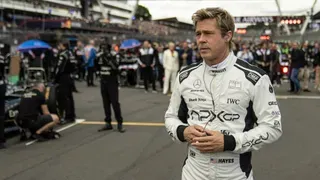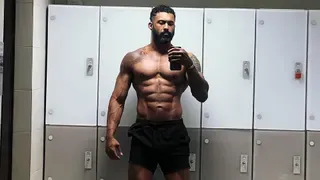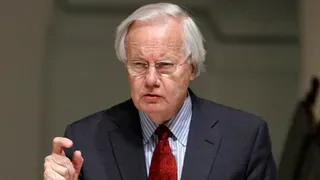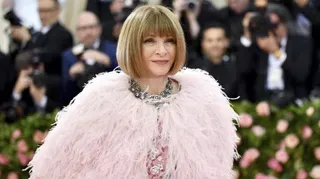December 5, 2012
Wu-Tang Clan's RZA Directs with 'Iron Fists'
Jake Mulligan READ TIME: 10 MIN.
Some people find the idea of RZA, leader of the Wu-Tang Clan, writing and directing a Hollywood-backed kung-fu film pretty ridiculous. But for those of us who have been following his career, his work on "The Man With the Iron Fists" couldn't be a more natural progression. Hell, the hip-hop maestro's first album - "Enter the Wu-Tang (36th Chamber)" - had a shout out to genre classic "36th Chamber of Shaolin" right there in the title (the star of that film, Gordon Liu, features in RZA's new film.)
But "Iron Fists" is more than just an abstract genre tribute (in fact, if anything, there's far too much going on in this movie.) It's a modern action film done in 2000s style wire-fu, it's a hammy comedy featuring a fattened-up Russell Crowe cavorting around a whorehouse high on opium, it's a Blaxploitation picture complete with a requisite Pam Grier cameo and a top-shelf hip-hop soundtrack. You want the kitchen sink, you got it.
The afternoon before the Boston stop of his "Iron Fists" concert tour, RZA was kind enough to take some time out to school us on the mythos of kung-fu cinema (a regular on academic commentary tracks, he's quite honestly one of the most prolific experts on the genre around.) Jumping back and forth, we talk about Jimmy Wang-Yu, the Ol' Dirty Bastard and the rest of the Wu-Tang Clan, and even how he'll cook Quentin Tarantino a steak even though he's a vegetarian. But through it all, we always circled back to "The Man With the Iron Fists". No doubt, it's a labor of love; and a much more personal film than it may originally seem.
EDGE: Your film - I can't help but detect a classic Hong Kong vibe from it; it feels very Jimmy Wang-Yu [a legend of kung-fu cinema, he directed classics like "Master of the Flying Guillotine".] Could you talk a bit about your influences?
RZA: Oh, Jimmy Wang-Yu, wow. Definitely. "One-Armed Swordsman"! But yeah, this film is influenced by the whole spectrum of martial arts, I would say. 60s, 70s, 80s, and 90s. But then given an American sensibility. If you think about the styles of Chang Cheh ["Five Deadly Venoms"] or Lau Kar-Leung ["The 36th Chamber of Shaolin"].... If you think about Joseph Kuo, even, who did movies like "Mystery of Chessboxing", all the "Drunken Masters". He always had the villain with the white hair who comes out of nowhere, 'na mean? It's funny, working with my producers.... They wanted to write the character out. Poison Dagger. They were like "who the fuck is this guy?"
EDGE: Is he your take on the evil white haired villain?
RZA: Yeah, they didn't understand! I said "listen, man. This is part of the genre. There is ALWAYS a guy that pops the fuck up!" But yeah, not to ruin the film, but I took all those sensibilities from all those martial arts films, spun them into my imagination, and spit out something that I think is unique, actually. But also.... I'm American, 'na mean? I'm hip-hop. And we like things the way we like things. I made sure.... This film is not done by an Asian director, it's done by an American director; and it's done not by Asians but by Hollywood. So I gave it that Hollywood sensibility.
My producers were sure. They were like, "it's part of the deal, you play the Blacksmith," they appreciated me as an actor. But the task of holding that much weight, for me, it was puzzling my mind. I recall doing an interview with the LA Times where they were like, "Are you going to be in the film?" and I was like, "you know, to be honest with you, I'm Captain Kirk right now. If I don't have a Mr. Spock, I don't see how I can be in this film." But Eli came over, and I had a Mr. Spock. When I felt nervous or troublesome about doing something, I shared some words with him.
EDGE: You mention Eli Roth; you've had the chance to work with some truly legendary contemporary filmmakers, men like Quentin Tarantino and Jim Jarmusch, in your work as a composer. What did you take away from your time with them that made its way into this film?
RZA: Tarantino also came to the set as well, which made me feel so honored. To see my mentor, or [in kung-fu parlance] "my master," bless the set and then tell me - he said "Bobby, you have captured the authenticity of all the old kung-fu films, with the opulence of the modern." He said that and I was like "ah, that's the best right there."
But on a technical level, I get a lot from these great minds. Like, Jim Jarmusch will do a shot, right, and he'll stay on the character for a long time. Nothing will happen! Like in "Ghost Dog". He don't say nothing, nothing ain't happening, it's just you and this character. And you begin to drift in your own mind, watching these Jim Jarmusch movies.
I learned a lot from those brothers. Quentin is my mentor, you know? And even John Woo. John Woo, he taught me so many things. I [produced] an Album called "Only Built 4 Cuban Linx" [which features many lines "sampled" from Woo's masterpiece, "The Killer".] I was able to sit down with John after I did that album. Lunch after lunch, in New York, in LA... We'd talk about "Bullet in the Head", "Hard Boiled", and I picked up a lot of knowledge from him. And all that came to fruition while I was directing the film.
And I'll share this with y'all. Being a man who was able to work in post-production as a composer, it gave me extra experience. I've been in post-production plenty of times. And being an actor, working in principal photography with someone like Ridley Scott - from him I learned the concept of "multi-vision". Quentin shoots with one camera. That's just what he does. Eli goes with like two cameras. Ridley has gone up to 18 cameras - and even more now, I've heard! The number is just a myth now. But on "American Gangster", we had a lot of camera setups just for dialogue.
That concept clicked in my head. "Multi-vision is needed." Throughout my film, I used multi-vision. Now, it was nowhere near this man - 18 cameras, nah nah nah [laughs.] But 4, 6 cameras for my maximum, 'na mean? Eli even said something about that to me. "Bobby, it's your first film, and you got six fucking cameras!"
EDGE: You've got a lot of strong personalities on set; a lot of badass guys. I have to ask, did you have to break up any fights on set?
RZA: These fighters, their starting all these rivalries with each other, and I'm just thinking "this shit remind me of Meth and Raekwon!" And I told 'em that! They may be mad at me about this, you know? It's a family, and some family stuff you keep to yourself. But it's a movie though, and this [the press tour] is part of the experience, and you guys'll probably be in the film world someday, you may come across this....
EDGE: You've got a very disparate collection of fighting styles among the cast. How'd you develop your own?
RZA: I mean, you asked me about Jimmy Wang-Yu. You know, Jimmy Wang-Yu wasn't a martial artist in real life - you know that? He was a barfighter! He got into fights in bars. I took that from Wang-Yu, actually. Because I haven't practiced forms. I thought like Jimmy Wang-Yu - I'm a fucking barfighter.
EDGE: So did any Wu-Tang stuff, maybe even mythology, sneak its way into the movie?
RZA: This may sound weird as fuck, but Russell Crowe, man, he's a serious actor. One of the best in the world man - you can't deny that. "A Beautiful Mind?" How can I get a guy like this to come and play somebody whose not real? Who has no historical bearing? Yeah, so I got a character for him. I said, "Yo, let's use ODB [the late Ol' Dirty Bastard of the Wu-Tang Clan] as the fucking mentality of your character." I said, "go ol' dirty!"
I mentioned it to him, but would you believe about two weeks before we start shooting, he calls me up. Says, "Bobby, I'mma go Ol' Dirty." And when you see this film, you're going to know exactly what I mean.
EDGE: Not many films, if any at all, have made a great use of hip-hop music. Do you feel a need, maybe even a responsibility, to show people the right way to match that type of music to moving images?
RZA: That was actually the pressure that dawned on me. This is a fun film, 'na mean? You remember a song from "Cuban Linx", 'North Star'? I wrote at least 20 pages to that track. So we get to post-production, and I'm putting these things in the movie, and the producers looking at me. Like, "this shit is too serious, this shit is too deep. Hold on Bobby, what you doing? Where's the groove at baby?" That's probably why the first cut was 4 hours [smirks.] There was one scene where 'North Star' - or actually, it was the Barry White song we sampled [in 'North Star'] - plays from beginning to end, and then plays again! I was sitting there loving it, and they're sitting there, like "Oh my god, what the fuck?"
They said "listen, Bobby, we know you love what you're doing, but...." That's being a first time director it happens I think; you love everything you got. It's like when you make your Moms your first sandwich, and the pickles all crooked and shit. But you learn how to make it better. Music's a big part. The studio said, "put your music in the movie. Please." I said, "I wasn't going to score this. I wrote it, I directed it, I fucking acted in it, I'm done!" They said "the fans are going to expect you to score this." Were they right about that?
EDGE: I assumed you would.
RZA: The studio president told me that, and I doubted him. Don't doubt the president of the studio. But I went to Quentin's, I'm cooking him a steak - I don't eat meat, but I'll cook him a steak - I'm like, "Yo, they want me to score this!" Quentin goes, "Bobby, who else is going to score it??" I thought he'd have some sympathy - Nah.
The Man With the Iron Fists is currently in theaters.
